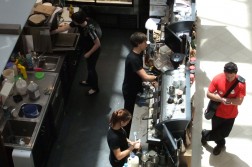People often lament the decline in civility and manners in modern political discourse, but by historical standards, we’re not doing too badly.
Back in the 1700s, the conservative’s conservative, Edmund Burke, threw a knife onto the floor of Parliament in England in order to make a point about the French Revolution. Even at their worst, you can’t really see Anthony Albanese or Tony Abbott doing that, can you?
But knives were nothing compared to what the Duke of Wellington got up to in his Prime Ministership. He challenged a political opponent, Lord Winchelsea, to a duel (Winchelsea subsequently wrote a letter of apology to the Duke). This, in turn, was nothing compared with the dueling efforts of the seventh President of the United States, Andrew Jackson, who had his honour satisfied some 103 times. (Readers may be reassured to know that he only killed one person during his whole dueling career.)
As a modern equivalent to Burke’s dagger or Jackson’s pistol, consider Mark Latham’s spade. It came in an interview with Maxine McKew during June 2002, in The Bulletin:
Look, this idea that politics can be too rough and too personal is a bit rich. I can take you to any sports field any Saturday morning and show you parents getting stuck into it. Having a go at the ref, yelling abuse, it’s part of the Australian way. We’re not a namby-pamby nation that hides our feelings. I think we’re a nation that’s willing to call a spade a spade and, if need be, to pick up the spade and whack someone over the head with it.
Latham has since been roundly criticised for quotes like this, but when you look at it in the historical context, you can’t help but notice that the material daggers and pistols of yesteryear have given way to Latham’s hypothetical spade. Words and gestures are the weapons of choice in modern politics, and members of modern Parties have a wide selection of artillery with which to wound their opponents.
In effect, we live in the era of the insult because name-calling is one of the only weapons politicians have left.
One of the most popular is the accusation of extremism. According to the Coalition, Labor is made up of ‘Commies,’ ‘Socialists,’ ‘Marxists,’ ‘Trotskyites,’ ‘Leninists,’ ‘Stalinists’ and even ‘Maoists.’ The occasional description of Right-wing figures as ‘fascist’ has its roots in early- to mid-20th century rivalries. In Australia, it may have stuck following a visit Menzies paid to Hitler’s Germany in the 1930s. However, as his 16-year stint as Prime Minister in the 1950s and 1960s showed, any efficacy the label may have had in the 1940s quickly wore off.
Accusations of extremism have their uses, but they are rather limited in their ability to describe the shifting allegiances and changing views of political Parties. They define a false opposition rather than a real one. For this reason, perhaps, far simpler metaphors such as colour, food and drink are sometimes deployed.

Thanks to Lukas
Left-wing voters are apparently associated with caffeine and alcohol, since terms such as ‘Latte Liberal’ and ‘The Chardonnay Set’ are common. In part, this simply reflects anxiety over changing culinary habits in Australia. But these perceptions easily change. The 18th century in which Hogarth portrayed ‘Gin Lane’ a community ruined by the new drink, gin gave way to the 20th century, in which gin and tonic became the drink of choice for generations of Americans. Cafe culture is just as entrenched in Liberal electorates as in Labor ones. It could be that we have already seen the rise and fall of the term ‘chardonnay socialists’ as a criticism of the Left.
Colour is another common theme. Menzies and his US equivalents across the Pacific warned against ‘reds under the bed,’ a memorable phrase that found a convenient enemy in the far Left. By contrast, Liberals are described as ‘silvertails’ or ‘born with a silver spoon in their mouth’ or, at the other end of the spectrum, ‘rednecks.’ The Greens are sometimes described by opponents as ‘watermelons‘ green on the outside, red on the inside. However, this metaphor seems to be more popular with political hacks than the public, judging from its infrequent appearances in the papers.
Insults can also take an alliterative turn: ‘Left-wingers’ are also described as ‘lunatics’ or ‘loonies,’ while ‘Right-wing rednecks’ are also labeled ‘rabid’, ‘ratbags’ or even ‘racists.’ And when insults are at this generic level, either side can use them: ‘Right-wingers’ can be ‘lunatics’ too.
Even more confusing is the universal acceptance of ‘liberal’ as a term of abuse. Labor’s enemies are sometimes the Liberals and sometimes classical economic liberalism. Socialists oppose both the Liberals and neo-liberalism. Even the Liberals hate the liberals: the Right hates the ‘liberal Left’ or the ‘liberal wets.’ (It’s worth remembering that the main 19th century, pre-Labour opponents of the British Tory Party were the Liberals.)
Leaders of Parties often find themselves attracting insults and even more so when they become leaders of countries. So John Howard is described as ‘Jackboot Johnny’ (in line with the Leftist habit of aligning the Liberal Party with the Nazis) or ‘Kim Il John.’ Size is a convenient metaphor: Howard becomes ‘Little John,’ ‘Little Johnny Howard,’ or ‘The Little Monkey.’ Howard is apparently Bush’s ‘lapdog’ or ‘poodle.’ (Again, these derive from the early 20th century socialist lexicon.) He is not only a ‘little deputy sheriff,’ but also, apparently, a ‘rat,’ ‘the little rodent,’ and ‘Ratty.’
This last insult is a particularly interesting metaphor, since it derives from Howard’s characteristics of political cunning and shrewdness, not in themselves bad things: in order to make them seem malicious, they are rolled in with the ‘rat’ image. It is ironic that the Left finds itself deploying a stereotype which has earlier been used by (among others) the Nazi Party. There have also been various attempts to make puns on Howard’s name, from the incredibly bad ‘ John HoWARd’ to the sly ‘ John Coward-Hunt.’
Eleven years on from 1996, John Howard, the jackboot-wearing-cunning-rodent-monkey-man, is still in power. Insults are fun and help to communicate certain messages, but will they make a politician cry? Ah if you want to do that, a much more effective and satisfying method would be simply to beat them at the polls.
Donate To New Matilda
New Matilda is a small, independent media outlet. We survive through reader contributions, and never losing a lawsuit. If you got something from this article, giving something back helps us to continue speaking truth to power. Every little bit counts.



